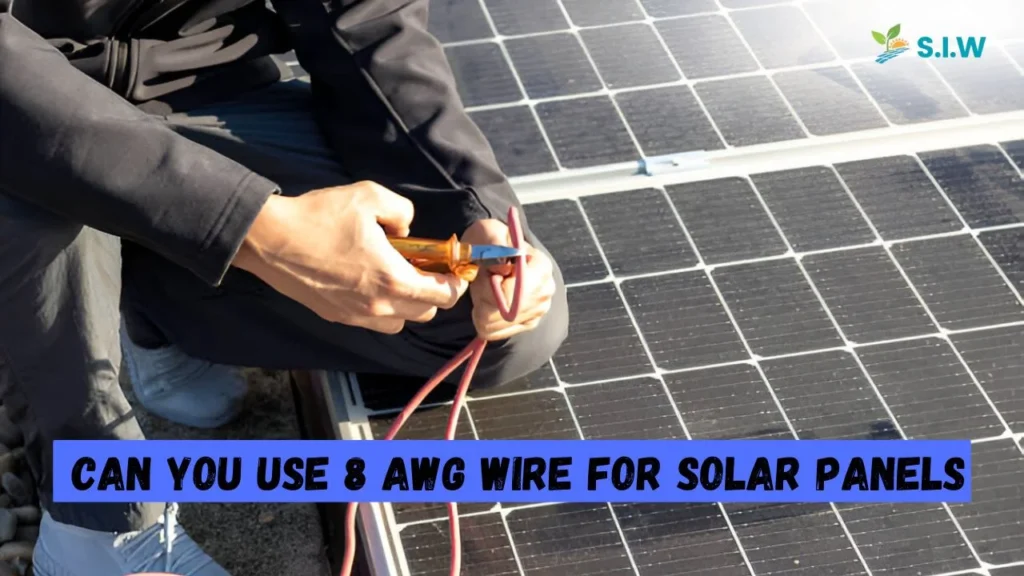Selecting the right wire gauge is essential for ensuring the efficiency and safety of your solar power system. Proper wire sizing is crucial to preventing energy loss and potential hazards. This article will address whether an 8 AWG (American Wire Gauge) wire is suitable for solar panels, considering factors like voltage drop, current-carrying capacity, distance, and the overall requirements of your solar installation.
Understanding 8 AWG Wire
The 8 AWG wire gauge, commonly used in solar systems, can handle specific current loads and is designed for moderate distances. It has a diameter of approximately 3.26 mm (0.1285 inches) and can typically carry a current of 40-55 amps in optimal conditions, depending on insulation type and ambient temperature.
Factors in Choosing Wire Size for Solar Panels
1. Current Capacity
The wire gauge must match or exceed the maximum current that the solar panel system can generate. An 8 AWG wire is rated for about 40-55 amps, which may be suitable for many small to medium-sized solar installations but may not be sufficient for larger systems generating high current levels.
2. Voltage Drop
Voltage drop is a critical factor in solar systems. For optimal performance, it’s advised to maintain a voltage drop below 3%. Calculating voltage drop involves the distance from the panels to the charge controller or inverter, and an 8 AWG wire may be suitable for runs up to 40-50 feet for 12V or 24V systems, depending on the current.
Here is the formula to calculate voltage drop:
Voltage Drop (V) = Current (Amps)×Distance (Feet)×Resistance (Ohms per foot) / 1000
3. System Voltage
Higher voltage systems, such as 48V systems, can afford smaller wire gauges due to reduced current demands. However, lower voltage systems (12V or 24V) may need thicker wires due to the higher current required to deliver equivalent power.
4. Distance from Solar Panels to Battery Bank or Inverter
Longer distances increase resistance and voltage drop, necessitating a thicker wire. For example, if the distance exceeds 50 feet, an 8 AWG wire may not be ideal due to the potential for excessive voltage drop, which could result in power loss.
5. Temperature Rating and Insulation
Wire insulation type affects the current-carrying capacity. Wires with higher temperature ratings, such as those with XLPE or THHN insulation, can carry more current than those rated for lower temperatures.
Is 8 AWG Wire Suitable for Your Solar Panels?
When 8 AWG Wire Is Suitable
- Systems with a maximum current of around 40-50 amps
- Distance from panels to the inverter or battery bank under 50 feet
- Systems operating at 24V or 48V with moderate power requirements
When to Consider a Larger Gauge
- Systems producing currents above 55 amps
- Long wire runs over 50 feet
- Lower voltage systems where voltage drop would impact performance
Explanation:
- Solar Panels to Charge Controller: An 8 AWG wire is adequate if the current does not exceed 40 amps and the distance is within limits.
- Charge Controller to Battery Bank: Sizing depends on the controller’s output, but 8 AWG may suffice for moderate distances.
- Battery Bank to Inverter: For efficient power delivery to the inverter, this connection often needs a larger gauge, especially for high-wattage systems.
FAQ
1. What is the maximum current an 8 AWG wire can carry for a solar panel system?
An 8 AWG wire can handle 40-55 amps in optimal conditions, but it depends on insulation type, temperature, and installation conditions.
2. How far can I run an 8 AWG wire for my solar panel system?
For a 12V or 24V system, an 8 AWG wire can be run up to 40-50 feet without significant voltage drop. For distances over 50 feet, consider a thicker wire.
3. Does system voltage affect my choice of 8 AWG wire?
Yes, higher voltage systems (like 48V) can use smaller gauges because they require lower current to deliver equivalent power.
4. Is 8 AWG wire suitable for a 48V solar system?
It may be suitable, especially for systems with a current demand within the 40-55 amp range and shorter wire runs.
5. What insulation type is best for 8 AWG wire in solar systems?
XLPE and THHN are good options due to their high-temperature tolerance, which can support the maximum current capacity of the wire.
Selecting the right wire for your solar installation maximizes efficiency and safety. Consider the unique specifications of your system and evaluate if an 8 AWG wire meets all your requirements. For long distances or higher currents, opting for a larger gauge is recommended.








